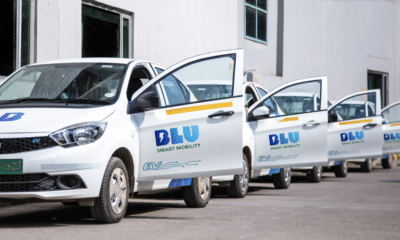Auto
Union Budget 2022: Here is what EV makers expect from the govt
Electric mobility has gained significant traction in India over the last few years. The EV adoption is widely seen as the best bet against vehicular pollution and a likely exit route from unreliable supply and prices of petroleum products. EV sales more than doubled to 3.29 lakh units last year, with industry experts estimating a more substantial growth spurt in 2022. However, the sector faces a multitude of challenges including inverted tax structure, lack of better finance facilities and inadequate charging infrastructure. Industry players are pinning hope on the union budget 2022 to drive faster adoption of EVs in the country.
Here is what top executives from EV space are expecting from union budget 2022:
Extension of FAME II subsidy
“To keep up the consumer demand and to drive faster adoption of EVs, we are hopeful that the FAME II subsidy would continue well beyond 2023. The EV sector requires such early bird incentives to accelerate manufacturing and consumer adoption to ensure stability in the coming years as we see new players emerging offering reliable products and value compared to petrol vehicles”, says Tarun Mehta, co-founder & CEO of e-scooter start-up Ather Energy.
Incorporation of EVs under the priority lending sector
“The focus has to be towards reduction in the initial purchase price and overall cost of ownership of an EV and achieving net-zero carbon emission goals. To do so, many aspects are essential for a measurable outcome, such as incorporating EVs under the priority lending sector to provide lower interest rates to the customers, a dedicated budget for the ‘Clean Air’ campaign and bringing together a wider diaspora of players to take advantage of policies like the PLI scheme to drive faster adoption in the EV segment”, says Naveen Munjal, MD of Hero Electric, India’s leading electric two-wheeler manufacturer.
Also Read: Union Budget 2022: Edtech players expect lower GST, better digital infra, ESOP tax revisit
Inverted tax structure a constraint for EV space
Arun Vinayak, Co-founder & CEO, Exponent Energy said: “The government’s done a splendid job of supporting the EV ecosystem in India till date. However, there are a few areas they can address to further spur growth. Due to the inverted tax structure that currently exists (where EVs are taxed at 5% and battery packs alone at 18%). Several constraints are placed on new OEMs as well as the development of new models like Battery As A Service.”
“While the nodal and state level delegation of charging station deployment and policies around that make the process faster, infrastructure spending support for DISCOMS to support EV charging will accelerate deployment of charging stations across the country. The government has rightly introduced the PLI scheme to foster domestic production of Li-ion cells but the time taken to set up a cell manufacturing ecosystem will take at least 3 to 5 years. In the interim, reducing the import duties on Li-ion cells would greatly benefit EV startups to make EVs affordable and spur consumer demand,” he added.
Need for lucrative incentive options
“It must be made mandatory under the ‘Go Electric’ initiative of the central government for each state in India to have its own dedicated EV policy. So far, there are more than seven states that have introduced exceptional incentives for the purchase of electric vehicles by individuals as well as corporates, and these have proven to have created a highly positive and enabling ecosystem for EVs”, said Jeetender Sharma, MD and founder of e-scooter manufacturer Okinawa Autotech.
To fast-track growth of charging infrastructure
Akash Gupta, Co-founder and CEO, Zypp Electric, “India is undergoing a massive EV revolution – which will get a further boost in 2022 following the rapid growth of charging infrastructure and advanced EV models. We are optimistic that the government will announce new initiatives to encourage local EV manufacturing, facilitate easy finance, and create an innovative EV ecosystem.
With that said, we urge the government to reduce GST on EV purchases and rentals from 5% to 2%. A reduced GST would allow consumers to smoothly shift to EV. The Finance Ministry can also reduce taxes levied on loans taken to purchase an EV. GST reduction and tax benefits would play a crucial role in making EVs accessible to everyone. Additionally, the government can also subsidise electricity pricing for EV charging to further improvise the existing EV charging infrastructure.”
More R&D needed in battery technology development
“To create a robust ecosystem for Electric Vehicles and give a boost to the EV market, the Indian government should focus on putting EVs in the priority lending sector, as currently very few NBFC’s and financial institutions are providing affordable lending to potential end-users as well as fleet operators. Additionally, the Government also needs to push for more R&D in affordable and indigenous battery technology development, which currently is the biggest pain point for EV players. Our current dependence on lithium imports of which 90% is dominated by Chinese players is a strategic disadvantage for Indian EV manufacturers,” said Shubhankar Chaudhry, CEO, One Moto India.
Flexibility in remittance of foreign funds
“Post-pandemic the startup ecosystem is booming at a neck break speed in terms of funding and adoption. However, increase in economic activity is yet to be seen which is giving revenue pressure for startups. Govt should introduce some flexibility in attracting or remitting foreign funds for companies that are registered under startup (DPIIT programs). This should help startups ease the processes involved, give laxity in penalties for any delay in GST or such statutory filings, ensure quick resolution of any disputes of compliance-related matters. It will save a lot of time for founders to focus on work and also ease up the funding process which gets on hold for such statutory filings,” said Mr. Mridu Mahendra Das, Co-founder and CEO, Automovill










































